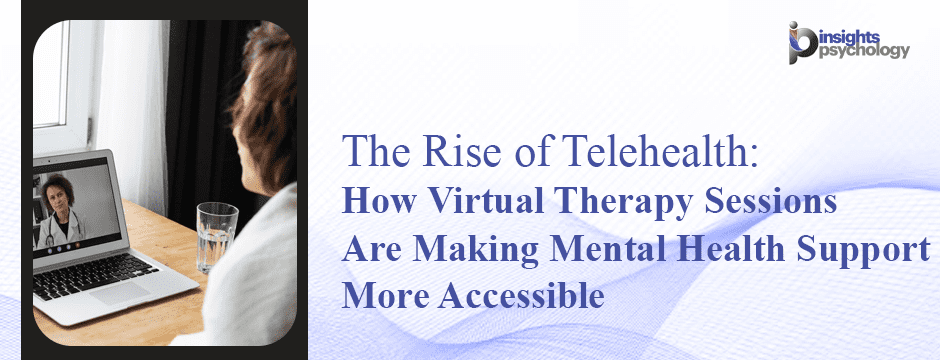Let’s be honest. Life feels heavier these days. Between work stress, social expectations, personal challenges, and the constant hum of the digital world, many of us are carrying more than we let on. And while mental health has finally started getting the attention it deserves, the path to actually getting help can feel like a maze.
That’s where virtual therapy, or telehealth, steps in. Not as a futuristic concept, but as a very real, very effective solution for people who want help—on their own terms.
At Insights Psychology, we’ve watched the evolution of telehealth closely, not just as therapists and providers, but as people. We’ve seen how it’s transformed access to mental health care. We’ve seen the difference it’s made in the lives of busy parents, remote workers, students, and professionals. And we’re here to share what we’ve learned—not in jargon, but in real words for real people.
Mental Health: More Talked About, But Still Hard to Reach
Sure, awareness is growing. Social media campaigns, influencers, and even celebrities are opening up about mental health. But here’s the truth: for millions, actually finding support is still a struggle.
Some of the barriers:
- Location: Not everyone lives near a therapist.
- Stigma: Some still worry what others might think.
- Time: Let’s face it, life is full.
- Cost: Therapy can be pricey, and insurance doesn’t always cover it.
So even though the conversation is louder than ever, too many people are left out of it. This is where virtual therapy isn’t just helpful—it’s game-changing.
What Is Virtual Therapy, Really?
Think of virtual therapy as a regular session with a licensed therapist—just without the commute, waiting room, or awkward small talk in the lobby. It’s usually done through secure video calls, though some people opt for phone sessions or even messaging-based support.
You still get the same level of professional care. You just get to do it from your own space, whether that’s your kitchen table, your parked car, or your couch. And that change? It makes all the difference.
The Real Benefits: Why People Are Choosing Virtual Therapy
1. You Can Access It From Anywhere
Whether you live in a big city or a small town, virtual therapy brings support to your doorstep. You no longer have to travel for hours or be limited by what’s available in your zip code.
2. It Fits Into Your Life
Forget rearranging your entire day to make it to a 4 PM appointment. With virtual sessions, you can schedule therapy during a lunch break, early in the morning, or even late at night. It adapts to your lifestyle, not the other way around.
3. It’s Private and Discreet
There’s something freeing about not having to physically walk into a therapist’s office. For some, it’s the difference between seeking help and staying silent. Virtual therapy offers confidentiality and a sense of control over your environment.
4. It’s Often More Affordable
Therapists offering virtual services often have lower overhead, which can mean lower rates. Many insurance plans now cover online therapy, and some platforms offer sliding scale fees or subscriptions.
Who's Using Virtual Therapy? (Hint: Probably Someone Like You)
The image of someone in therapy has shifted. It’s not just for crisis or breakdowns. These days, people are using therapy for all kinds of reasons:
- To manage anxiety or depression
- To improve relationships
- To navigate career burnout
- To heal from trauma or grief
- To simply talk things through with someone neutral
We see clients who are students juggling deadlines, new parents battling exhaustion, entrepreneurs dealing with pressure, and retirees adjusting to new phases of life. Mental health is a human need—not a luxury.
What It’s Like to Get Started (No Surprises, No Pressure)
At Insights Psychology, we’ve made it as easy as possible to start.
Step 1: Find Your Therapist
Browse through profiles. Read about each therapist’s approach. Look for someone who feels like a fit.
Step 2: Book a Session
Pick a time that works for you. Morning, evening, weekends—there’s usually something that fits.
Step 3: Log In and Talk
When your session begins, you’ll join a secure call. It’s one-on-one, completely private, and focused on you. No tech expertise needed.
That’s it. You’re on your way.
Does It Really Work?
We get this question a lot. And honestly? Yes. Research shows that virtual therapy is just as effective as in-person care for many mental health conditions. That includes anxiety, depression, PTSD, and more.
The key is the relationship between you and your therapist—and that connection can absolutely be built online. In fact, some people find it easier to open up in a familiar environment.
Why It Makes Sense Now More Than Ever
Here’s the truth: the way we live has changed. Work, learning, shopping, even relationships—they’re all happening online. Mental health support is just catching up. And frankly, it’s about time.
Virtual therapy brings care to people who were previously left out. It gives us options. It makes therapy feel less intimidating. It meets us where we are—literally and emotionally.
At Insights Psychology, we’re not just offering a service. We’re helping people take control of their emotional wellbeing in a way that feels modern, flexible, and safe.
For Businesses and Providers: A Smart Investment
Telehealth isn’t just helpful for clients. It’s also smart for therapy practices.
- Lower overhead means sustainable operations
- It allows you to serve more clients across wider geographies
- It enhances flexibility and resilience (especially during disruptions like pandemics)
- It meets growing demand among tech-savvy, convenience-oriented clients
From a marketing standpoint, being visible in the online therapy space is no longer optional. People are searching for support. If they don’t find you, they’ll find someone else.
Making Mental Health Searchable
At Insights Psychology, we’re serious about making support findable. That’s why we:
- Optimize for search engines using real, user-driven queries
- Write content that answers real questions, like “How does online therapy work?”
- Share client stories (with permission) that make the experience feel relatable
- Focus on authenticity, not clinical fluff
When someone types, “I feel overwhelmed and don’t know what to do,” we want to be the resource that shows up—and makes them feel seen.
Ready to Take That Step?
You don’t need to have it all figured out. You don’t need a diagnosis. You don’t need to wait for a crisis.
If you’re curious about therapy, that’s enough. If something feels off, that’s enough. If you’re tired of carrying everything alone, that’s more than enough.
With virtual therapy, support is closer than ever. And with Insights Psychology, you’re never just another appointment. You’re a person. A story. A priority.
Let us help you write the next chapter—with clarity, calm, and connection.
Everything You Need to Know About Virtual Therapy and Telehealth Services
1. What is virtual therapy?
Virtual therapy—also known as telehealth therapy—is professional mental health support delivered through secure video or phone platforms. It allows individuals to connect with a licensed therapist from home, making care more accessible and flexible. Whether you’re searching for a telehealth psychiatrist, virtual therapy ensures continuity of care without travel or waiting rooms.
2. What’s the best virtual therapy?
The best virtual therapy sessions offer licensed professionals, easy scheduling, and insurance-friendly options. Look for platforms with experienced providers who offer telehealth appointments tailored to your needs—such as trauma, depression, anxiety, or relationship issues. Clinics like Insights Psychology connect you with a therapist near you that takes insurance, combining accessibility with expert care you can trust.
3. What do therapists notice about their clients?
During telehealth therapy, therapists notice patterns in mood, behavior, language, and body language—even virtually. They pay attention to emotional cues, coping strategies, and progress over time. In virtual therapy sessions, subtle changes in tone or facial expressions help therapists adapt support strategies. An experienced telehealth psychiatrist can also monitor responses to medication and adjust treatment accordingly.
4. Is online therapy covered by insurance?
Yes, many virtual therapy sessions are covered by insurance. Most major providers now support telehealth appointments, making it easier to access care. To ensure coverage, search for a therapist near me that takes insurance and confirm that the provider accepts your plan. Clinics like Insights Psychology make it simple by offering insurance-friendly scheduling with licensed therapists and psychiatrists.
5. Are virtual therapy sessions worth it?
Absolutely. Virtual therapy sessions offer convenience, privacy, and real results—especially when balancing busy schedules or remote locations. Whether it’s weekly telehealth therapy or consultations with a telehealth psychiatrist, clients often find virtual care just as effective as in-person visits. Plus, with flexible scheduling and insurance acceptance, it’s a valuable way to access professional mental health care on your terms.
Now that you understand how virtual therapy makes care more accessible, explore how trauma-focused techniques drive genuine transformation.

